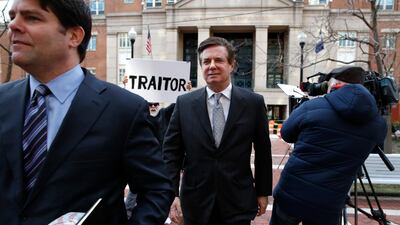A federal judge in Virginia rejected a bid by President Donald Trump’s former campaign chairman Paul Manafort to throw out charges in the special counsel’s Russia investigation, clearing the way for a much-anticipated trial to start as scheduled next month.
The decision on Tuesday by US District Judge T S Ellis III was a setback for Mr Manafort in his defence against tax and bank fraud charges brought by special counsel Robert Mueller.
It also deals a blow to a favoured talking point of Mr Trump and his legal team as they continue to attack Mr Mueller’s investigation. The president had applauded Judge Ellis for his sceptical comments and pointed questioning during a hearing in which he asked the special counsel’s team whether they brought the case to get Mr Manafort to testify.
Mr Trump had even read some of the judge’ quotes aloud during a National Rifle Association rally, and as late as early June, Trump lawyer Rudy Giuliani had built up suspense around the ruling, saying the judge was taking weeks to craft an opinion because “there’s a real problem” with Mr Mueller’s appointment.
But in a 31-page ruling, the judge rejected the argument of Mr Manafort’s attorneys that the special counsel had exceeded his authority by bringing charges unrelated to Russian election interference. He said that Mr Mueller’s appointment as special counsel was lawful and that he was within his authority to investigate Mr Manafort and file charges against him.
Yet he also expressed wariness about an excessively powerful special counsel, saying, “the appointment of special prosecutors has the potential to disrupt these checks and balances, and to inject a level of toxic partisanship into investigation of matters of public importance".
“This case is a reminder that ultimately, our system of checks and balances and limitations on each branch’s powers, although exquisitely designed, ultimately works only if people of virtue, sensitivity and courage, not affected by the winds of public opinion, choose to work within the confines of the law,” he added.
Judge Ellis also largely agreed with the ruling of US District Judge Amy Berman Jackson, who presides in Mr Manafort’s criminal case in Washington. She ruled earlier this year that it was “logical and appropriate” for Mr Mueller to investigate Mr Manafort and that prosecutors had received authorisation to do so. Judge Jackson had also previously thrown out a civil case Mr Manafort brought challenging Mr Mueller’s authority.
Prosecutors had argued that Mr Mueller was within his authority, citing an August 2017 memo from Deputy Attorney General Rod Rosenstein. The memo shows Mr Rosenstein authorised Mr Mueller to investigate Mr Manafort’s Ukrainian work and related financial crimes.
Mr Ellis issued the ruling after prosecutors provided him with a full copy of the memo, which also includes the specific activities he is authorised to investigate involving other people beyond Mr Manafort, at least through the middle of last year.
Prosecutors had publicly filed in court a heavily redacted copy of the three-page memo last month, but Judge Ellis had bristled at the redactions and requested a full copy be provided to him under seal.
His decision allows one of two criminal cases against Mr Manafort to proceed. The Virginia indictment charges him with bank fraud and tax evasion and accuses him of hiding tens of millions of dollars he earned advising pro-Russia politicians in Ukraine from 2006 through 2015. It also accuses him of fraudulently obtaining millions in loans from financial institutions, including while he worked for the Trump campaign.
Mr Manafort also faces charges of money-laundering conspiracy, false statements and acting as an unregistered foreign agent for Ukrainian interests. Those were charges brought in federal court in Washington. None of the charges relate to allegations of Russian election interference and possible co-ordination with Trump associates, the main thrust of Mr Mueller’s public appointment order.

